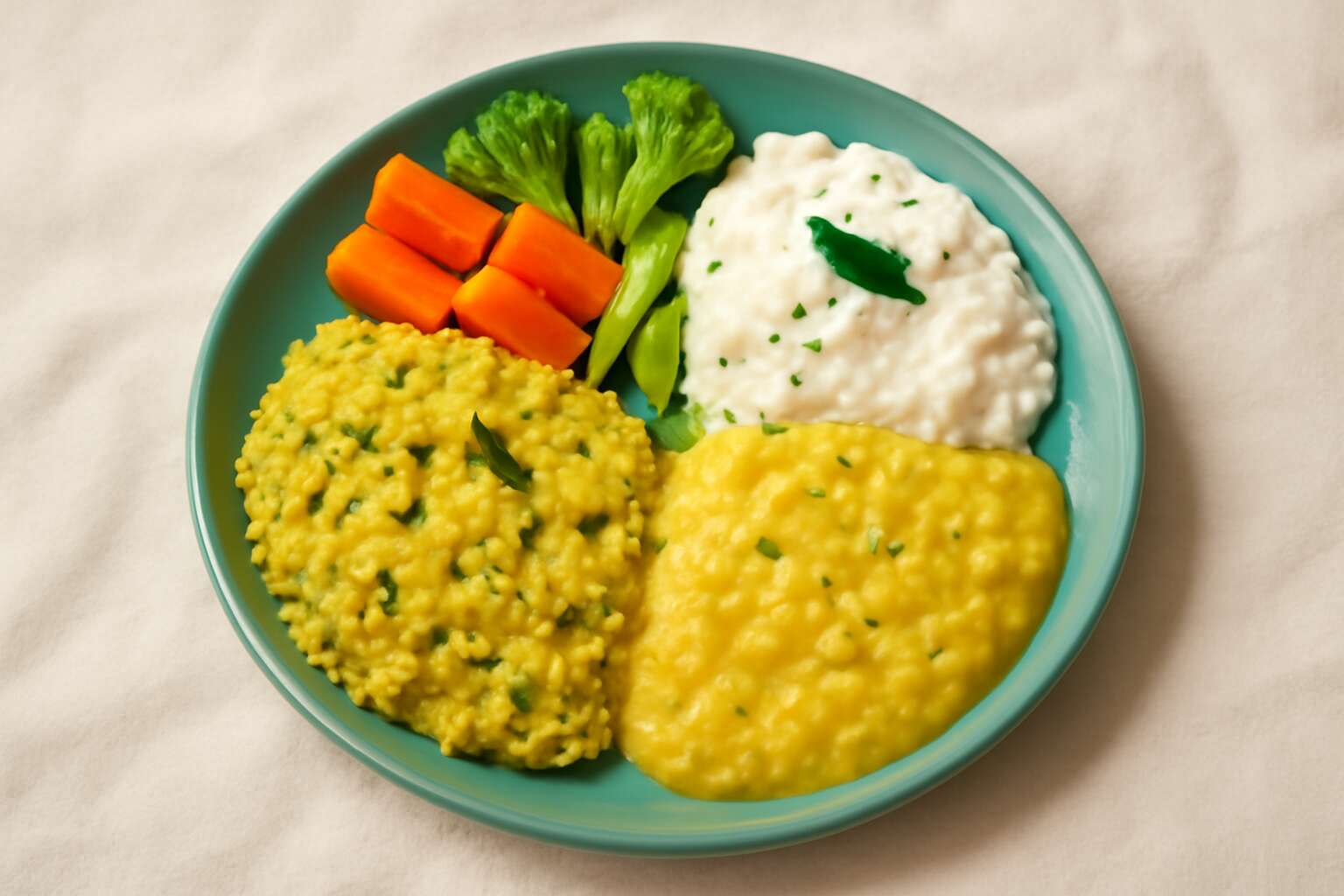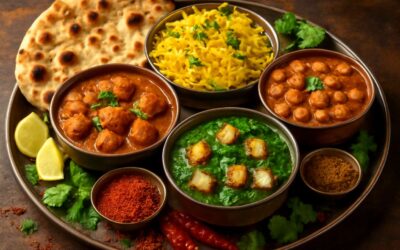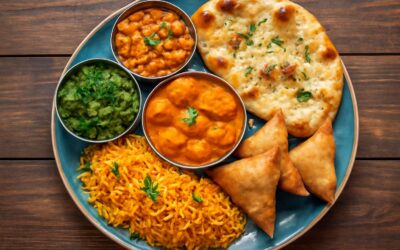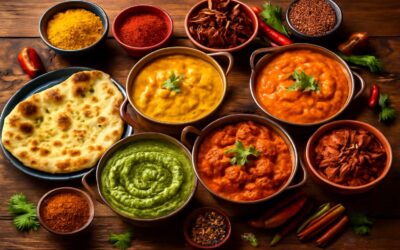Understanding Mouth Ulcers and Dietary Considerations
What Are Mouth Ulcers? – Definition, symptoms, and common causes
Mouth ulcers are more than just a minor discomfort; they can profoundly impact daily life, often making eating a chore rather than a pleasure. These painful sores, medically known as aphthous ulcers, typically present as round or oval white or yellowish lesions surrounded by an inflamed red border. They can appear anywhere inside the mouth, including the tongue, inner cheeks, or lips. Common causes include stress, nutritional deficiencies, or minor injuries from biting or dental work. Interestingly, certain foods and habits can exacerbate or soothe these ulcers, influencing how we choose what to eat during this uncomfortable phase.
When navigating the world of Indian food to eat during mouth ulcers, it’s essential to prioritize gentle, soothing options. Spicy curries and acidic chutneys may aggravate the pain, while bland, cooling dishes can offer relief. Incorporating ingredients such as cool yogurt, mashed potatoes, or soft rice-based dishes can help maintain nutrition without irritating the sores. For those seeking flavorful yet gentle options, focusing on dishes that balance spice and acidity is key. Remember, avoiding overly hot or salty foods can significantly speed up healing and reduce discomfort.
Importance of Proper Nutrition During Mouth Ulcers – How diet affects healing and discomfort
Mouth ulcers can turn eating into a painful ordeal, making nutrition more crucial than ever. Proper diet during this time can significantly influence healing and comfort. When considering indian food to eat during mouth ulcers, choosing gentle, soothing dishes is essential. Spicy or acidic foods may worsen the discomfort, so opting for softer, cooling options helps protect the sensitive sores. Nutrient-rich, easy-to-digest foods support the body’s natural healing process and can reduce inflammation.
Incorporating foods like yogurt, mashed potatoes, and soft rice-based dishes can provide vital nutrients without irritating the sores. These options not only soothe the mouth but also help maintain energy levels. It’s important to avoid overly hot, salty, or spicy indian food to eat during mouth ulcers. Instead, focus on dishes that balance flavor with gentle ingredients, making the healing process more manageable and less painful.
Challenges of Eating Indian Food with Mouth Ulcers – Spicy, tangy, and textured food considerations
Mouth ulcers can make even the simplest meal a daunting challenge. When craving Indian food to eat during mouth ulcers, understanding how certain ingredients affect your sores is crucial. Spicy and tangy dishes, laden with chili and acidic tomatoes, often exacerbate pain and delay healing. The textured nature of some Indian foods, like crunchy papad or crispy vadas, can also irritate sensitive areas in the mouth.
Choosing the right Indian dishes requires careful consideration. Soft, bland options like khichdi, softly cooked dals, and steamed rice can offer nourishment without adding discomfort. Incorporating gentle spices such as turmeric or cumin can add flavor without the burn of chili. To avoid unnecessary pain, steer clear of overly hot, salty, or tangy foods, focusing instead on nourishing, soothing options that support healing during this vulnerable time.
Indian Food Qualities Suitable for Mouth Ulcers
Characteristics of Gentle and Healing Foods – Non-acidic, soft, and soothing textures
When faced with the discomfort of mouth ulcers, the desire for nourishing, gentle sustenance becomes an urgent necessity. Indian food to eat during mouth ulcers must embrace qualities that soothe rather than irritate. Think soft, non-acidic textures—creamy dals, well-cooked rice, and tender vegetables—that melt effortlessly in the mouth, minimizing pain and promoting healing. Such foods are not merely about avoiding discomfort but about nurturing the body’s innate capacity to recover.
Healing foods should possess characteristics that align with the body’s need for gentle nourishment. They are typically non-spicy, avoiding the tangy and fiery elements often associated with Indian cuisine. Instead, they focus on mild flavors and soft consistencies, which help preserve the delicate mucosal lining. Incorporating ingredients like cumin, coriander, and turmeric in a subtle manner can add flavor without aggravating the ulcers. This balance between taste and gentleness highlights the importance of choosing Indian food to eat during mouth ulcers that supports both comfort and recovery.
Ingredients to Focus On – Anti-inflammatory properties, soothing spices, and nourishing ingredients
When navigating the discomfort of mouth ulcers, selecting the right Indian food to eat during mouth ulcers can make all the difference in easing pain and promoting healing. Certain ingredients possess natural anti-inflammatory properties that soothe inflamed tissues, reducing irritation and accelerating recovery. Spices like turmeric, known for its potent anti-inflammatory benefits, can be incorporated subtly into dishes to provide relief without aggravating sensitive mucosa.
Focus on nourishing ingredients that are gentle and easy to digest. Well-cooked lentils, soft rice, and tender vegetables are staples in Indian cuisine that fit perfectly into this category. These foods offer a comforting texture that melts effortlessly in the mouth, minimizing discomfort. Additionally, herbs like cumin and coriander add flavor without the fiery heat often associated with Indian spices, ensuring the dish remains gentle yet flavorful.
To enhance the soothing qualities of Indian food to eat during mouth ulcers, consider dishes seasoned with calming spices and ingredients that support tissue repair, such as aloe vera or coconut milk. These natural elements not only nourish but also create a protective barrier, aiding the healing process. Remember, choosing foods that are non-acidic and mildly spiced ensures your diet remains both delicious and healing during this delicate time.
Recommended Indian Dishes During Mouth Ulcers
Soft and Mild Indian Curries – Dal, khichdi, and other easy-to-digest options
In the delicate dance of healing, choosing the right indian food to eat during mouth ulcers can feel like navigating a labyrinth of flavors and textures. Soft, soothing dishes become your allies, wrapping your palate in a gentle embrace. Imagine bowls of warm dal, where the pulses melt into a comforting broth, nourishing your body without aggravating tender tissues. These mild indian curries are not just sustenance but a balm—calming and easy to digest, perfect for those days when the mouth demands kindness.
Khichdi, a humble yet divine concoction of rice and lentils, stands out as an ideal choice. Its velvety texture and subtle flavors make eating a pleasure rather than a chore. When seeking the best indian food to eat during mouth ulcers, opt for dishes that are non-acidic, soft, and infused with gentle spices. Incorporating ingredients with anti-inflammatory properties can further ease discomfort, transforming mealtime into a moment of healing and nourishment.
Non-Spicy Soup Varieties – Multhani, moong dal soup, and herbal broths
When dealing with mouth ulcers, choosing the right indian food to eat during mouth ulcers can feel like a culinary minefield. Luckily, some soothing, non-spicy soup varieties are your best allies in easing discomfort and nourishing your body. These gentle broths, such as multhani and moong dal soup, are packed with anti-inflammatory properties and are naturally soothing, making them ideal for tender mouths. They offer a warm, comforting experience without irritating delicate tissues.
Herbal broths infused with healing ingredients like turmeric and coriander are also excellent options. They not only hydrate but also provide gentle nourishment that doesn’t aggravate mouth ulcers. For those seeking variety, consider trying
- creamy lentil soups
- vegetable purees
that are smooth and easy to swallow. These dishes are a testament to how the right indian food to eat during mouth ulcers can turn mealtime from a chore into a healing ritual.
Nutritious Side Dishes – Raita, flavored yogurts, and soft chutneys
As the tender tissues of your mouth beg for gentle nourishment, selecting the right Indian food to eat during mouth ulcers becomes an art of compassion and care. Soft, cooling side dishes can transform mealtime into a sanctuary of healing, soothing inflammation while delighting the senses. Raita, with its creamy yogurt base and subtle tempering, offers a refreshing respite, calming inflamed tissues with every cool spoonful. Flavored yogurts seasoned with mild herbs provide a gentle burst of probiotics and nourishment, perfect for tender mouths craving relief.
Complementing these are soft chutneys—crafted with ingredients like coconut, mint, or coriander—that add flavor without the fiery kick. These delicate accompaniments elevate your meal, ensuring each bite is both soothing and satisfying. For added variety, consider dishes such as dal or khichdi, which are naturally soft and easy to swallow, ensuring your palate remains nourished without aggravation. These nutritious side dishes, when paired thoughtfully, exemplify the essence of the best Indian food to eat during mouth ulcers—gentle, healing, and infused with the kindness of culinary tradition.
Key Ingredients to Incorporate in Indian Food for Mouth Ulcers
Dairy Products – Yogurt, milk, and buttermilk for soothing effects
When battling mouth ulcers, comfort trumps culinary adventure—yet, Indian food to eat during mouth ulcers offers a surprising oasis of relief. Dairy products like yogurt, milk, and buttermilk aren’t just for breakfast; they act as soothing agents that coat irritated tissues, easing pain and inflammation. Incorporating these into your diet can transform a grueling ulcer episode into a bearable one, while also providing essential nutrients for healing.
For those seeking variety, consider adding soft, mild Indian dishes such as dal or khichdi—think of them as gentle hugs in culinary form. These dishes are not only easy to digest but also rich in anti-inflammatory ingredients that support your body’s healing process. To make your diet even more comforting, flavorful yogurts and soft chutneys can be incorporated into your meals, offering both nourishment and a soothing touch to sore mouths. When choosing indian food to eat during mouth ulcers, prioritize non-spicy, non-acidic options that nourish without aggravating the condition.
Herbs and Spices – Turmeric, coriander, fenugreek for healing and anti-inflammatory properties
When it comes to Indian food to eat during mouth ulcers, the brilliance lies in selecting ingredients that champion healing and soothe rather than irritate. Among these, herbs and spices such as turmeric, coriander, and fenugreek stand out for their potent anti-inflammatory and antimicrobial properties. These ingredients do more than flavor; they actively bolster the body’s natural healing processes and reduce inflammation in tender tissues.
Turmeric, often dubbed the golden spice, contains curcumin—an antioxidant powerhouse renowned for its ability to combat inflammation. Coriander seeds, with their gentle aromatic profile, are another valuable addition, known to soothe sore mouths and support tissue repair. Fenugreek, meanwhile, has been celebrated for centuries in Indian medicine for its healing virtues, making it a wise choice when curating Indian food to eat during mouth ulcers.
- Incorporate turmeric in soft, mild curries or broths to harness its healing magic.
- Use coriander to flavor soothing chutneys or seasoned lentil dishes, avoiding overly spicy or acidic preparations.
- Add fenugreek seeds to gentle stews or teas, allowing their anti-inflammatory benefits to shine through without overwhelming delicate tissues.
By thoughtfully integrating these herbs and spices into your diet, you create a culinary environment that nurtures recovery. The key is to focus on subtlety—favoring non-spicy, non-acidic Indian food to eat during mouth ulcers—while still enjoying the rich tapestry of flavors Indian cuisine offers. After all, comfort during such a delicate phase is the greatest spice of all.
Vegetables – Soft-cooked carrots, squash, and spinach
In the shadowed corridors of healing, what we consume can either nourish or torment our delicate tissues. When seeking Indian food to eat during mouth ulcers, the focus must shift toward ingredients that soothe and mend rather than inflame. Soft, cooked vegetables emerge as silent guardians—carrots, squash, and spinach—offering gentle textures that glide past tender lesions without causing pain. Their inherent anti-inflammatory properties make them essential allies in recovery, turning every bite into a balm for the wounded interior.
Among the most revered ingredients in this healing journey are vegetables that can be prepared to melt effortlessly on the tongue. For example, steaming carrots and squash until they reach a tender softness transforms them into a comforting, nutrient-rich refuge for sore mouths. Spinach, with its mild bitterness and vitamin-rich profile, can be incorporated into mild dals or purees, adding both flavor and healing virtues.
Incorporating these vegetables into your diet requires a thoughtful approach—favoring slow-cooked or pureed forms. An
- orderly progression from chewable to smooth textures
ensures nourishment without pain. The harmony of gentle Indian dishes, infused with healing herbs and spices, creates a culinary sanctuary where mouth ulcers find a moment’s respite amidst the chaos of discomfort. The subtle magic of these vegetables, woven into the tapestry of Indian cuisine, offers a pathway back to comfort, one tender bite at a time.
Foods and Ingredients to Avoid During Mouth Ulcers
Spicy and Acidic Foods – Chilies, tamarind, citrus-based ingredients
When battling mouth ulcers, the last thing you want is to aggravate the pain with foods that are too spicy or acidic. Indian food to eat during mouth ulcers should prioritize soothing, gentle ingredients that support healing rather than hinder it. Spicy elements like chilies and fiery masalas can intensify discomfort, while tangy ingredients such as tamarind and citrus-based condiments may amplify irritation in sensitive oral tissues. These components, though integral to authentic Indian cuisine, can turn a healing process into a fiery ordeal.
Instead, focus on milder preparations that maintain flavor without discomfort. For example, opt for dishes that feature soft, well-cooked vegetables and mild spices like turmeric and coriander, which possess anti-inflammatory properties beneficial for recovery. When choosing Indian food to eat during mouth ulcers, steer clear of complex, spicy curries or tangy chutneys, and instead embrace nourishing options like dhals, khichdi, or soothing herbal broths. Your mouth will thank you as these gentle foods help ease pain and promote faster healing.
Crunchy and Hard Foods – Nuts, crispy snacks, chips
In the realm of Indian cuisine, textures matter just as much as flavors when battling mouth ulcers. Crunchy and hard foods—think nuts, crispy snacks, and chips—can turn a gentle healing process into an uncomfortable ordeal. These foods, with their jagged edges and abrasive nature, may cause further irritation to the sensitive tissues of your mouth, prolonging discomfort rather than alleviating it.
For those seeking Indian food to eat during mouth ulcers, it’s vital to avoid such crunchy temptations. Instead, embrace softer, easily digestible options that soothe rather than aggravate. Gentle preparations like steamed vegetables or soft rice dishes reduce friction and aid healing. Incorporating ingredients like well-cooked lentils or khichdi can provide nourishment without risking additional pain. Remember, the goal is to keep your mouth calm and supported on its journey to recovery—no crunchy distractions allowed!
Fermented and Pungent Items – Fermented pickles, garlic, onions
Few things are as perplexing as navigating the world of Indian food to eat during mouth ulcers. While the aromatic spices and vibrant flavors beckon, certain ingredients can sabotage your healing process. One such category that demands caution is fermented and pungent items. These ingredients, staples in many Indian kitchens, can intensify irritation and delay recovery.
Fermented pickles, garlic, and onions are known for their pungency and acidity, which can aggravate sensitive mouth tissues. The sharp tang of pickles or the fiery burst of garlic and onions might seem tempting, but they often cause discomfort when your mouth is already inflamed. To protect your healing journey, it’s wise to avoid these pungent ingredients and opt for milder, soothing alternatives.
In fact, selecting gentle ingredients like well-cooked vegetables and mild spices can be a game changer. Instead of spicy chutneys or raw onions, consider soft, steamed vegetables or herbal broths that provide nourishment without irritation. Remember, the goal is to create an environment conducive to healing — one free from the fiery tang of fermented and pungent foods that could prolong pain and discomfort.
Tips for Preparing and Eating Indian Food During Mouth Ulcers
Preparation Tips – Blending, softening, and mild seasoning techniques
When navigating the delicate terrain of mouth ulcers, choosing the right indian food to eat during mouth ulcers becomes paramount. The goal is to indulge in dishes that soothe rather than exacerbate discomfort, transforming mealtime into a gentle ritual of nourishment. Techniques such as blending ingredients into smooth, velvety textures help minimize abrasive bites, while softening vegetables ensures they’re easy to swallow. Mild seasoning, avoiding overly spicy or acidic elements, is essential—think of dishes infused with soothing herbs like turmeric and coriander, which possess natural anti-inflammatory properties.
Creating a comforting Indian meal during this sensitive period involves focusing on ingredients that promote healing. Incorporating soft-cooked vegetables like carrots, squash, and spinach ensures minimal irritation to the ulcers. To elevate the healing process, consider preparing dishes such as dal or khichdi—both of which are gentle on the mouth and rich in nourishing elements. These options not only soothe the oral cavity but also deliver vital nutrients, supporting quicker recovery. Remember, the key lies in simplicity—a harmonious blend of textures and mild flavors that respect the body’s need for gentle sustenance during mouth ulcers.
Eating Tips – Eating slowly, avoiding irritants, maintaining hydration
When managing mouth ulcers, the way you approach eating becomes just as crucial as the choice of food itself. The secret lies in savoring Indian food to eat during mouth ulcers that is gentle, nourishing, and easy to swallow. Eating slowly and mindfully helps prevent further irritation while allowing your body to absorb vital nutrients without the added discomfort of rushed bites.
Maintaining hydration is another vital aspect. Warm herbal teas or buttermilk can soothe inflamed tissues and support healing. During this delicate period, it’s wise to avoid spicy, tangy, or acidic foods—these irritants can intensify the soreness and hinder recovery. Instead, focus on soft, mild dishes like dal, khichdi, or pureed vegetable curries, which are not only comforting but packed with anti-inflammatory ingredients.
Incorporating nutrient-rich, soothing Indian food to eat during mouth ulcers doesn’t have to be complicated. Simple techniques like blending ingredients into silky textures or softening vegetables ensure that mealtime remains a gentle ritual, helping you heal faster without sacrificing flavor or nutrition.
Meal Planning – Balanced, nourishing meals that promote healing
Crafting nourishing Indian food to eat during mouth ulcers requires thoughtful meal planning that prioritizes gentle, healing ingredients. The goal is to create a balanced diet that provides essential nutrients without irritating delicate tissues. Incorporating soft, mild dishes like khichdi or pureed vegetable curries ensures that mealtimes remain comforting and easy to swallow. These dishes are ideal for promoting quick recovery while satisfying your palate.
To enhance healing, focus on ingredients known for their anti-inflammatory properties, such as turmeric and coriander, which can be seamlessly integrated into your meals. When preparing Indian food to eat during mouth ulcers, softening vegetables like carrots, spinach, and squash is crucial. These nutrient-rich vegetables provide vital vitamins and minerals that support tissue repair. Additionally, including dairy products like yogurt and buttermilk can soothe inflammation and keep hydration levels optimal—an essential aspect of recovery.
Meal planning should also consider the use of mild seasonings and techniques like blending or softening ingredients. This approach not only minimizes discomfort but also preserves the nutritional integrity of each dish. For instance, a smooth lentil soup or a gentle, spiced yogurt-based raita makes for ideal Indian food to eat during mouth ulcers. Balancing these elements ensures nourishment, comfort, and a faster healing process, all while savoring familiar flavors that make healing a little more delightful.
Additional Home Remedies and Lifestyle Tips
Traditional Remedies for Mouth Ulcers – Herbal rinses and soothing ingredients
When battling mouth ulcers, the soothing power of traditional herbal rinses and gentle ingredients can be nothing short of miraculous. Many swear by rinsing with a warm infusion of turmeric and licorice root, both renowned for their anti-inflammatory and healing properties. These herbal rinses not only calm the irritated mucosa but also expedite the healing process, offering relief that’s as comforting as a warm cup of chai on a rainy day.
In addition to herbal remedies, incorporating specific lifestyle tips can make a tangible difference. For example, applying a paste of honey and turmeric directly to the ulcer can provide immediate soothing relief while harnessing their natural healing virtues. Moreover, embracing a diet rich in nourishing and non-irritating foods—think soft, mild Indian food to eat during mouth ulcers—can support your body’s recovery without aggravating the condition.
Lifestyle Practices – Maintaining oral hygiene, avoiding irritants
Maintaining optimal oral health during mouth ulcers isn’t just about avoiding discomfort; it’s about nurturing your body’s natural healing process with the right choices. Incorporating gentle Indian food to eat during mouth ulcers can make a significant difference, especially when your palate is sensitive. Soft, nourishing dishes like khichdi and dal provide essential sustenance without irritating delicate tissues, ensuring your body stays fueled for recovery.
Beyond dietary adjustments, adopting mindful lifestyle practices can accelerate healing. Maintaining diligent oral hygiene—gently brushing with a soft-bristled brush and avoiding harsh mouthwashes—reduces the risk of secondary infections. Additionally, steering clear of irritants such as spicy or acidic foods, which can exacerbate discomfort, is crucial. Instead, focus on hydration and soothing Indian food to eat during mouth ulcers, like warm herbal teas or lassi, which support your body’s resilience.
For a more holistic approach, consider the benefits of herbal remedies and traditional techniques. For example, rinsing with a warm infusion of turmeric and licorice root can calm inflamed mucosa and promote healing. Incorporating these natural remedies into your routine, alongside gentle Indian food to eat during mouth ulcers, creates a nurturing environment for quick recovery. Remember, patience paired with nourishing habits often yields the most comforting results in the journey of healing mouth ulcers.




0 Comments